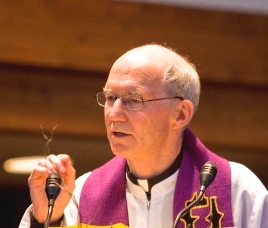Today we celebrate the Birth of John the Baptist. In our second reading St. Paul says that John heralds Jesus' coming by proclaiming a baptism of repentance. In John's time people knew they needed to repent - to change their hearts, to change their lives. People knew they had fallen short.
Today not so much. Most of us don't think we've done anything really wrong. I'm going to use an example from President Trump but it applies broadly. When he was running for president a reporter questioned him whether he ever asked God for forgiveness. "I like to be good. I don't like to have to ask for forgiveness," said candidate Trump. "And I am good. I don't like to do things that are bad. I try to do nothing that is bad." We might smile but we have to admit that attitude affects us all.
President Trump grew up deeply influenced by Rev. Norman Vincent Peale and his "Power of Postive Thinking." Positive thinking is OK as far as it goes. After all, we are created in God's image and from him we have received gifts. We should think positively about those gifts and ask God's help to use those gifts for his glory and the good of others.
Still we do need to take positive thinking a step further: to think positively not only about ourselves but about what God can do in us if we repent. Along with our bright side we have a dark side. We may not recognize it but other people do - especially the ones we live and work with. You and I have done things that require forgiveness. When we acknowlege that need, that need to change, then God can both forgive us and do powerful things in us.
We see this power when we face addictive behavior. We have patterns of thoughts and actions that cause harm: to us personally as well as to others. The 12 Steps program shows an effective way to deal with addiction. The 12 Steps have roots in Catholic theology. The first step says, "We admitted we were powerless over addiction–that our lives had become unmanageable." Then, "We came to believe that a Power greater than ourselves could restore us to sanity."
At Priest Days last week we listened to talks on how to help people dealing with sexual addictions. Bruce and Jeannie Hannemann have an online program for recovery called RECLAiM Sexual Health. Pornography can affect the mind like alcohol or drugs releasing chemicals that weaken or overpower the will. These things not only destroy the addict but cause great damage to the people close to him.
The devil can use addictions to take control of people and to spread misery. Before a person falls into immoral behavior the devil says, "It's no big deal. Everybody does it." When a person falls the devil changes his tune. "What you did is despicable and you are a despicable person. Go ahead and despair." When the devil says this there's really only one response: Go. To. You know where - hell. Yes, say that to the devil because that's where he belongs. Then say, "I belong to God. He made me and he redeemed me at a great price, the blood of Jesus. I'm not relying on my puny power. I rely on a Higher Power, the power of God, Jesus.
That's what John the Baptist did. St. Paul tells us that when John was completing his course he would say, "What do you suppose that I am? I am not he. Behold, one is coming after me..." John always points to Jesus and so should we.
This summer we are going to hear more about the power of Jesus' blood. By his blood we belong to God and we have forgiveness of sins. Same as our president none of us likes to ask for forgiveness. Yet we need a baptism of repentance - it's the first step to receiving the power of Jesus. Amen.

 RSS Feed
RSS Feed
